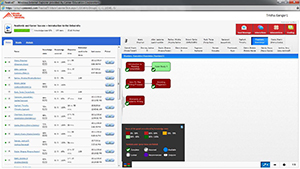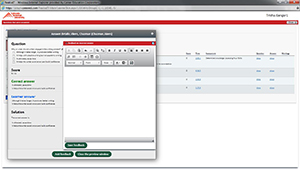Intellipath for MBA preparation
Published by: WCET | 10/15/2014
Tags: Adaptive/Personalized Learning, Assessment, Competency-based Education, Course Design, Innovation, Teaching, Technology, WCET, WOW Award
Published by: WCET | 10/15/2014
Tags: Adaptive/Personalized Learning, Assessment, Competency-based Education, Course Design, Innovation, Teaching, Technology, WCET, WOW Award
Today we welcome Colorado Technical University Chief Academic Officer and Provost, Connie Johnson and CTU faculty member, Sarah Pingrey as they share what their WCET Outstanding Work (WOW) award-winning program has done to improve the student and faculty experience in MBA-preparatory courses.
One of the great pleasures that I have as Chief Academic Officer of Colorado Technical University, is to work with a large group of talented faculty who embrace new technology to improve student learning. In 2012, CTU committed to creating a personalized learning experience for our students.
Because CTU has many adult students pursuing an MBA degree that may have an undergraduate degree in other disciplines, University Dean of Business, Dr. Gail Whitaker worked with the business program committee to integrate adaptive learning into business pre-requisites. The purpose was two-fold: to ensure that students received the content that he or she specifically needed as a knowledge-base for the MBA program and to comply with prerequisite requirements prescribed by Association Council for Business Schools and Programs (ACBSP). This innovative approach, which CTU received the WCET Outstanding Work award for, provided students with a tailored learning path for topics including accounting, statistics, economics and finance.
Central to the implementation of adaptive learning technology (Intellipath) were faculty who created relevant assessments and content for each course. Intellipath provides content to students determined by an assessment and provides instructors with the ability to work with students.
Sarah Pingrey, faculty member at CTU, shares her experience using the platform:
I started working on the adaptive learning platform Intellipath at CTU in the spring of 2012. From development to testing to piloting courses to full implementation, I’ve seen Intellipath grow into an essential learning platform for students. Throughout my teaching career other platforms have tried to woo me, but Intellipath does something different – faculty members are intimately involved in their students’ progress every step of the way.
 Teaching in an Intellipath classroom is such a joyful experience. Training is simple with videos and documents to review and a short quiz to demonstrate competency. Once training is complete and fundamental best practices are understood, the next step is to delve deeper into exactly what Intellipath offers and how to access and use this information. With so many students entering the classroom who are scared that mathematics will be the end of their college careers, I am to be able to follow their progress through the course objectives, praise their successes, and help them immediately when they struggle. Intellipath gives me the information I need to do this and there is no way a student can fall behind without me knowing.
Teaching in an Intellipath classroom is such a joyful experience. Training is simple with videos and documents to review and a short quiz to demonstrate competency. Once training is complete and fundamental best practices are understood, the next step is to delve deeper into exactly what Intellipath offers and how to access and use this information. With so many students entering the classroom who are scared that mathematics will be the end of their college careers, I am to be able to follow their progress through the course objectives, praise their successes, and help them immediately when they struggle. Intellipath gives me the information I need to do this and there is no way a student can fall behind without me knowing.
Intellipath contains detailed data for the entire class and for each student, and using this data effectively is crucial. The first thing I want to know is whether a student has started working on their weekly assignments. Intellipath clearly shows which students have started or completed the assignment. Also, it only takes a quick glance to find a student’s current knowledge score on the assignment, the number of objectives completed, the time spent working on the assignment, and the day that the assignment was last accessed. This information is such a treat for an instructor to have. Instructors can now motivate students who have not started the assignment and give praise to those who have.
 Students can also easily flag difficult problems. A detailed solution is provided to every problem, but if a student doesn’t understand the solution or has a question, they can easily flag the problem by just pushing a button. The problem, the student’s solution, and the scratch work can be viewed, and I am able to leave feedback for the student. Encouraging students to use this feature is crucial and students are very likely to use it since they are able to ask questions without having to directly email the instructor: pushing a button is easy.
Students can also easily flag difficult problems. A detailed solution is provided to every problem, but if a student doesn’t understand the solution or has a question, they can easily flag the problem by just pushing a button. The problem, the student’s solution, and the scratch work can be viewed, and I am able to leave feedback for the student. Encouraging students to use this feature is crucial and students are very likely to use it since they are able to ask questions without having to directly email the instructor: pushing a button is easy.
Intellipath has definitely led to more interaction between students and faculty. It has also changed the dynamics of synchronous lectures. Having the lectures apply to all students can be challenging when some students have already started their Intellipath assignments and have very specific questions, while other students don’t have enough foundational knowledge yet to jump into answering these questions. Having organized slides and corresponding class activities, and being able to jump around in them during the lecture, makes teaching more effective for both students and faculty.
The biggest challenge for an online professor can be making that initial connection with students. Students are struggling, but what they are struggling with is unknown until it is too late. Intellipath takes away the mystery of why a student is struggling and makes interactions between the instructor and student easy, fun, and often. I am excited for the future of Intellipath, and most of all, excited that students are truly learning!
If you’re interested in learning more about CTU’s Intellipath for MBA-preparation program, be sure to join us at the WCET Annual Meeting where Connie will share more about the program on Thursday, November 20.
 Connie Johnson
Connie Johnson
Chief Academic Officer & Provost
Colorado Technical University
 Sarah Pingrey
Sarah Pingrey
Professor
Colorado Technical University